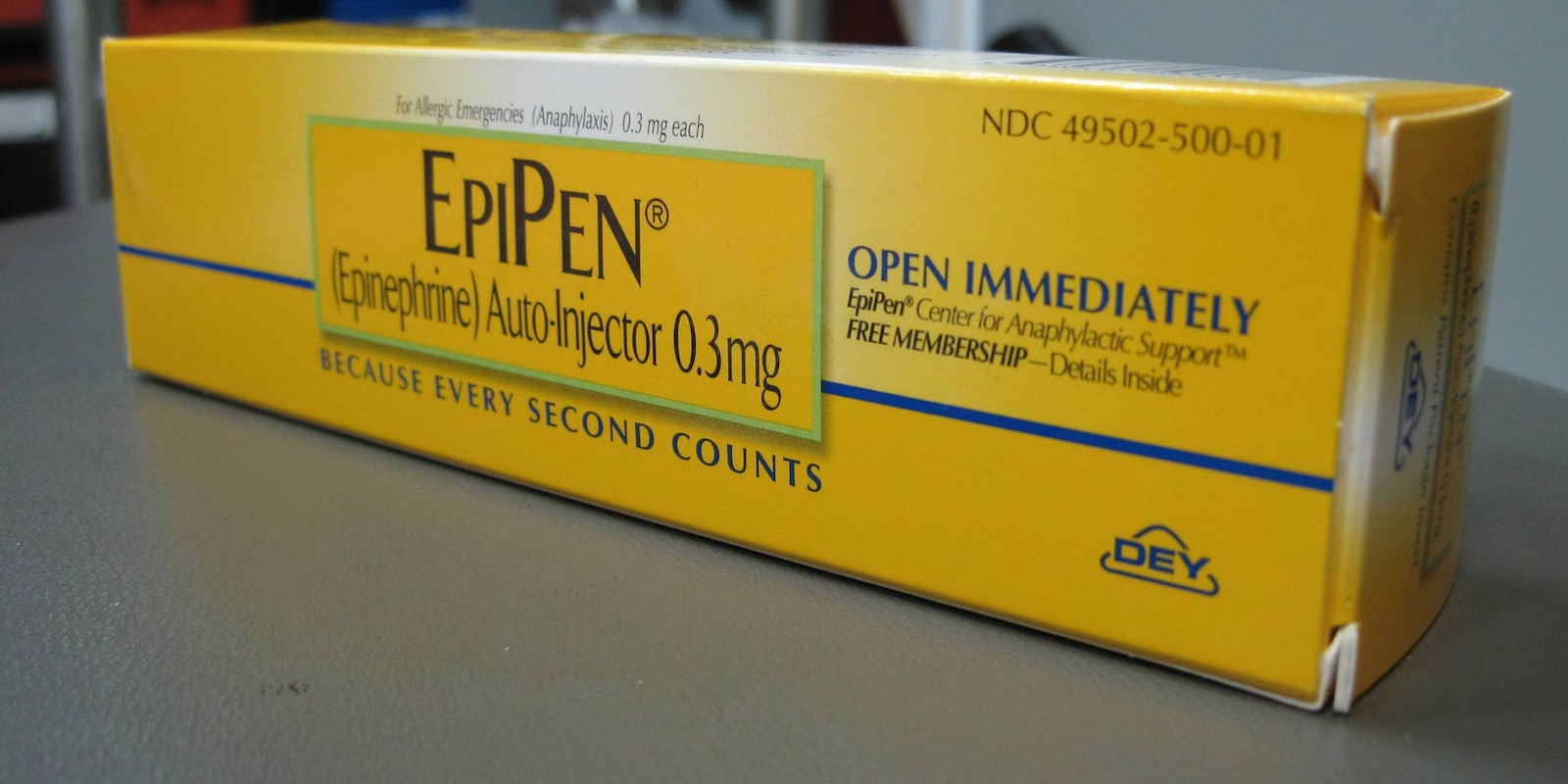After the internet whipped up a fury storm about the $600 price tag on a two-pack of the life-saving EpiPen, its manufacturer Mylan offered up a solution: a generic version for the low, low price of $300. Many are wondering: How can drug companies charge so much for a drug, especially one that cost only about $100 for the same dose in 2007?
The usual refrain is drug companies often make most of their money off of one or two major drugs and use the money from that to cover the high cost of research and development, as well as their less profitable drugs.
“Most academics are skeptical about that claim, at least to the extent that they make it,” Lynn Quincy, director of the Consumers Union’s Health Care Value Hub told the Daily Dot.
It’s hard to call out drug companies for their pricing because they’re notoriously reticent about explaining just how the costs break down and they can be misleading.
High prices mean higher premiums
Mylan’s CEO, Heather Bresch, has been quoted in multiple outlets blaming the spike in the price of EpiPens and other drugs on more patients opting for high-deductible health plans. But experts are skeptical of that claim.
“It’s a red herring, at the very least. It’s about getting everyone focused on the shifting insurance markets. Yes, people are switching to high-deductible plans. They’re less expensive, and for many families, it’s the only thing they can afford, and then they run into this situation and they get clobbered,” Kenneth Kaitin, director of the Center for the Study of Drug Development at Tufts University told the Daily Dot. “To start looking at things like, ‘Well people are on the wrong plans now…’ come on.”
Moreover, high drug prices translate to higher health insurance premiums. There’s a complex supply chain between drug manufacturers and the patients who eventually take them, with markups along the way. But the simple explanation is that insurance plans that cover some of the cost of a drug have to find a way to pay for it. They do it by increasing customer premiums. The higher a drug’s price climbs, the higher premiums climb as a result, Quincy said.
There’s no competition
There’s very little to stop companies from charging whatever the market will bear. Unlike other products, where business can easily jump into a market and provide competition that keeps costs down, pharmaceuticals have many hurdles that make it hard for newcomers and established companies to compete with any one drug.
The approval process with the Food and Drug Administration takes years for a new drug. Most drugs fail, and it truly does cost upwards of a billion dollars to bring a drug to market, according to Kaitin’s research. It’s faster when a generic drug company wants to bring a generic version of a popular drug onto the market, but it still takes time and costs money.
There are also patent laws that protect name-brand drugs from competition, Quincy noted. When a name-brand drug makes it to market, it enjoys a patent for several years that prevents other companies from making and marketing the same drug. Sometimes the FDA will even grant a period of exclusivity for drugs, even after the patent expires, that prevents other companies from competing.
Yet, epinephrine is a generic drug, Kaitin said, and Mylan is the only one that sells it. Mylan has rights to the injection device, but there’s nothing preventing another company from engineering a different device to deliver the same drug just as effectively. So why don’t they?
The FDA is a roadblock
“Traditionally, the FDA has nothing in its statute that says it should be considering the price of drugs or the economic issues regarding pharmaceuticals or generic drugs,” Kaitin said.
He thinks that may change, and soon. The FDA will likely not have the authority to set a price on the drug itself, Kaitin said, but he thinks soon they may be mandated to consider how some drugs in the pipeline may compete with other drugs on the market and to expedite the approval process accordingly.
“That, of course, demands greater resources. It means [the FDA has] to put down whatever they’re working on to move this product more quickly,” Kaitin said. “And you’re asking them to do that on a price motivation, which they’ve never done before.”
Even still, companies are unlikely to compete with certain drugs if they only help a small group of patients.
So what can you do?
Unfortunately, there isn’t a ton that consumers can do to help drive down their costs. Coupons for drugs might help individuals, but they unintentionally keep drug prices high because it results in consumers still buying the name brand drug.
You can also always ask your doctor or your pharmacist for a generic version of your drug. But it might not exist.
Kaitin suggested that if enough people write their congressman to express their concern over drug prices, some sort of government intervention would be more likely. Without it, public concern and anger are likely to continue.


